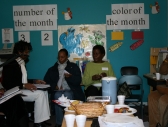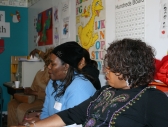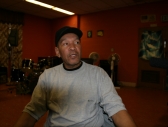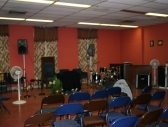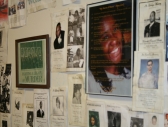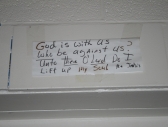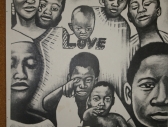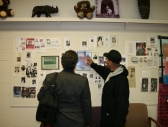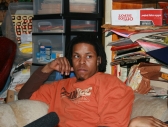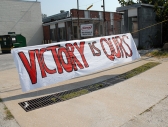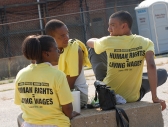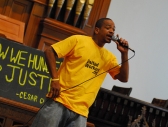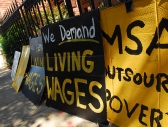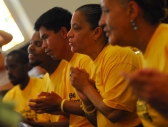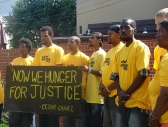The Stories of Working People in Our Community
The 2007 Peabody Award-Winning Series
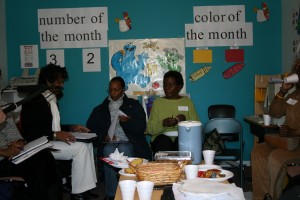 One voice not often heard on the airwaves, if at all, is that of the working poor. Hurricane Katrina brought the faces of America’s poor into the living rooms of our nation. Americans were appalled as they watched the tragedy unfold on the evening news, with the poor bearing the brunt of the damage.
One voice not often heard on the airwaves, if at all, is that of the working poor. Hurricane Katrina brought the faces of America’s poor into the living rooms of our nation. Americans were appalled as they watched the tragedy unfold on the evening news, with the poor bearing the brunt of the damage.
The deep divide between those of means and those without was driven home, as the justice became no longer economic but a glaring matter of life and death. People who were previously invisible were rendered visible. Suddenly, all could see the glaring disparities and the human consequences of those disparities. Suddenly, it was front page news.
But for how long? How long did it take until those people were rendered invisible once more? How long until mainstream Americans turned their heads away? It was just a matter of weeks, of mere months until people chose not to care anymore. The news crews went home, but the problems remained.
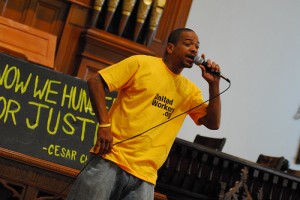 Baltimore faces its own set of challenges around the issues of poverty and justice. So many groups within the city and the surrounding region have been marginalized. On the fringes, these groups compete for meager government resources and ever scarcer private charity money. Community activists and ex-convicts struggle to save their streets while also fighting to be recognized as legitimate by city and state government. People trying desperately to leave lives of crime behind are stmymied when confronted with a lack of opportunities. Low wage workers struggle to fight large corporations to get a wage that lets them live a decent life.
Baltimore faces its own set of challenges around the issues of poverty and justice. So many groups within the city and the surrounding region have been marginalized. On the fringes, these groups compete for meager government resources and ever scarcer private charity money. Community activists and ex-convicts struggle to save their streets while also fighting to be recognized as legitimate by city and state government. People trying desperately to leave lives of crime behind are stmymied when confronted with a lack of opportunities. Low wage workers struggle to fight large corporations to get a wage that lets them live a decent life.
These experiences are important. These are the stories of human survival in our world. These are the people that would have been left behind during Hurricane Katrina.
Just Words exists to tell their stories.
Click the thumbnails below to view photos larger.
Listen to the podcasts »
Background
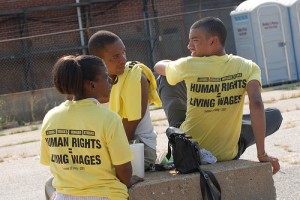 The initial incarnation of Just Words launched in 2003. It was supported by Open Society Institute-Baltimore, a leading force in the struggle to correct social disparity in the city. Just Words began as a series programs on the Marc Steiner Show on WYPR, combined with local news department stories that were aired during Morning Edition. Over a two years period, the series covered such important topics as day laborers, inner city public schools, prisoner reentry, prison conditions, addictions, and reforming poor communities. The voices of advocates from key local organizations such as the Public Justice Center, Homeless Person’s Representation Project, and Health care for the Homeless were heard, as well as those of the individuals whose lives were directly affected by the issues at hand. These individuals were given a forum where they could discuss their lives and struggles in their own words.
The initial incarnation of Just Words launched in 2003. It was supported by Open Society Institute-Baltimore, a leading force in the struggle to correct social disparity in the city. Just Words began as a series programs on the Marc Steiner Show on WYPR, combined with local news department stories that were aired during Morning Edition. Over a two years period, the series covered such important topics as day laborers, inner city public schools, prisoner reentry, prison conditions, addictions, and reforming poor communities. The voices of advocates from key local organizations such as the Public Justice Center, Homeless Person’s Representation Project, and Health care for the Homeless were heard, as well as those of the individuals whose lives were directly affected by the issues at hand. These individuals were given a forum where they could discuss their lives and struggles in their own words.
Next Step
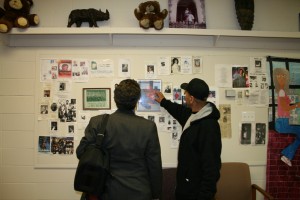 The original Just Words series provided a much-needed glimpse into the struggles faced by Baltimore’s inner city poor. To be a truly effective media presence, Just Words had to go beyond the original idea and platform. It had to travel outside of the studio and into the streets.
The original Just Words series provided a much-needed glimpse into the struggles faced by Baltimore’s inner city poor. To be a truly effective media presence, Just Words had to go beyond the original idea and platform. It had to travel outside of the studio and into the streets.
Just Words launched in December of 2006 as a year long weekly documentary features series. Made possible by a generous grant from OSI-Baltimore, it aired each Thursday during Morning Edition and All Things Considered. These four minute pieces were an honest examination of the life of all types of disenfranchised and marginalized people, such as gang members, ex-convicts, low wage workers, the mothers of murdered children, inner city children, daycare workers, waitresses and more. The subjects told their own stories, in their own words. They were asked to share their vision of how the world works, and to express the changes they wished to see take place. They shared their hopes, fears, and all emotions and thoughts in between. They opened their lives and showed what it means to be poor and nameless in America.
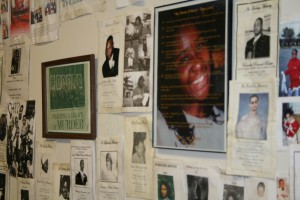 The effect of Just Words was both measurable and immeasurable. Measurable results included hundreds of thousands of dollars in public and private money being funneled towards the community programs and activists that were featured on Just Words . The immeasurable result is how many minds were changed. How many listeners heard Just Words and all of a sudden, saw the invisible people all around them? How many listeners changed the way they thought about young black men in Baltimore, or what should be done about the homeless? We can only begin to guess from the emails and comments were have received, but we are confident that Just Words opened many eyes and hearts.
The effect of Just Words was both measurable and immeasurable. Measurable results included hundreds of thousands of dollars in public and private money being funneled towards the community programs and activists that were featured on Just Words . The immeasurable result is how many minds were changed. How many listeners heard Just Words and all of a sudden, saw the invisible people all around them? How many listeners changed the way they thought about young black men in Baltimore, or what should be done about the homeless? We can only begin to guess from the emails and comments were have received, but we are confident that Just Words opened many eyes and hearts.
The Future
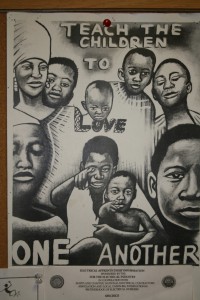 The Center for Emerging Media’s commitment to producing work that examines the experiences of marginalized people will continue far into the future. Whether through longer form documentaries, short features or a multi-media platform, we will continue to bring our audience the stories of people who are struggling to change their lives and their communities for the better. Just Words will continue, not only as a program produced by CEM in some fashion, but as a mission for CEM.
The Center for Emerging Media’s commitment to producing work that examines the experiences of marginalized people will continue far into the future. Whether through longer form documentaries, short features or a multi-media platform, we will continue to bring our audience the stories of people who are struggling to change their lives and their communities for the better. Just Words will continue, not only as a program produced by CEM in some fashion, but as a mission for CEM.
Update
In Memory of Lucille Robinson
Sep 25, 2008
I just got the news that Lucille Robinson passed away. Lucille was the first participant in our Just Words series about the working poor in Maryland. Hers was the story of a grandmother who is raising her grandchildren. Her daughter and son were missing in action, gobbled up by the seduction of the streets. Because of her husband’s death and her own illness, she lost her middle-class life in Columbia, Maryland and found herself back in the inner-city, raising children as she struggled through her seventies.
She was an angel, a lovely soul, with the deepest passion and commitment for children and for the well being of those with even less than she had. She told her grandchildren that they may not always have what they want to eat, but they will always eat in her home. She shared her morsels with those on her block who, if not for her, would go hungry.
She died. She should be alive. If she were not poor and Black, living in the inner city, she could have gotten the health care she needed to care for her lungs. She would still be ill but probably not dead. If she had not had to endure working conditions where she breathed in chemicals and asbestos when she was a young woman, this non-smoker might still be breathing and laughing among us.
She was a shining light. She inspired me. She inspired her grandchildren who loved to show her what they learned in school each day. When those kids, five of them, came home from school, they got their snack, then it was off to the basement to study before they went out to play. They are wonderful children. Who will care for them now?
When I interviewed Lucille around Christmastime 2006, she was struggling desperately to make ends meet on her meager social security and retirement income. She was so worried about what would happen to her children if she passed. She knew she was ill, and was holding on to life for all it was worth.
She struggled financially because the state will not support grandparents who are forced to raise their grandchildren. The state will pay for foster care parents and juvenile incarceration but not for families struggling to save their own children. Pro-family rhetoric is just that, rhetoric, with no substance in the real world.
The federal government can find almost a trillion dollars overnight to bail out wealthy Wall Street bankers but can’t afford to help strengthen the families of America. This is not the America I love.
The America I love came out in droves to help Lucille Robinson when they heard her story in December 2006. The America I love has a compassionate government which helps those who struggle to help themselves and their families.
Lucille Robinson, whose home was so warm and comfortable, did not ask for much. She just wanted enough to keep the lights on, keep her children fed and for her streets to be safe. She could take care of the rest.
Now, she is at rest.
Listen to Lucille Robinson’s story on the first 3 episodes of Just Words:


